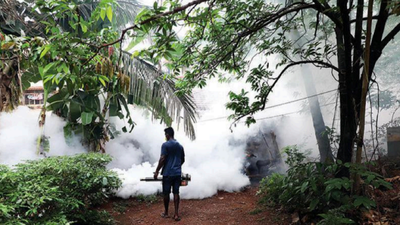Goa sees steady drop in dengue cases, but infection concentrated in migrant settlements

The decline in cases has been due to the awareness and cleanliness drives by health services and the civic bodies, said chief medical office
PANAJI: Goa has recorded a drop in dengue infections from January to October this year as compared to the corresponding period last year. However, in a trend that doctors say is similar to malaria infections, cases of the dangerous vector-borne disease were found to be largely concentrated in migrant settlement zones.
“This year, we have found cases of dengue in Karaswada, which borders Colvale and Mapusa and has migrant settlement zones. Some states have had a high incidence of dengue and since Goa sees an influx of migrants, more infections were detected among them,” Dr Kalpana Mahatme, chief medical officer in charge of the National Vector Borne Disease Control Programme (NVBDC) in Goa, said.
“Some labourers would return to Goa with fever and get admitted in hospital. When tested, dengue would be detected. Infections have declined since last month, but preventive measures have not stopped. Our focus has been on places that are inhabited by migrant labourers,” she said and added that instructions have recently been issued to health officials to enhance surveillance of construction sites, industrial estates and coastal areas where migrants live.
Between January and October, health services registered 383 cases as against 582 during a similar period last year. In 2019, however, 726 dengue cases were recorded, but the numbers fell significantly in 2020, the year the world was hit by the Covid-19 pandemic. Just 376 cases were recorded that year, but they almost doubled to 649 in 2021.
Two decades ago, the state grappled with an exponential rise in malaria cases that coincided with a significant increase in the floating migrant population. Health services had to consequently run a programme for malaria control with particular focus on migrants.
While malaria infections are now under control, the incidence of dengue has been on the rise over the past few years. The decline reported this year, Mahatme said, has been due to the aggressive awareness and cleanliness drives taken up by health services in collaboration with the civic bodies concerned.
“Due to heightened awareness, people report for testing without delay, while increased surveillance helps track cases and take preventive measures,” she said.
Wherever dengue infections were detected among the local population in urban areas, mosquito-breeding was inadvertently found in plates holding flower pots, fountains and decorative flowers left floating in large bowls of water, Mahatme said.
“This year, we have found cases of dengue in Karaswada, which borders Colvale and Mapusa and has migrant settlement zones. Some states have had a high incidence of dengue and since Goa sees an influx of migrants, more infections were detected among them,” Dr Kalpana Mahatme, chief medical officer in charge of the National Vector Borne Disease Control Programme (NVBDC) in Goa, said.
“Some labourers would return to Goa with fever and get admitted in hospital. When tested, dengue would be detected. Infections have declined since last month, but preventive measures have not stopped. Our focus has been on places that are inhabited by migrant labourers,” she said and added that instructions have recently been issued to health officials to enhance surveillance of construction sites, industrial estates and coastal areas where migrants live.
Between January and October, health services registered 383 cases as against 582 during a similar period last year. In 2019, however, 726 dengue cases were recorded, but the numbers fell significantly in 2020, the year the world was hit by the Covid-19 pandemic. Just 376 cases were recorded that year, but they almost doubled to 649 in 2021.
Two decades ago, the state grappled with an exponential rise in malaria cases that coincided with a significant increase in the floating migrant population. Health services had to consequently run a programme for malaria control with particular focus on migrants.
While malaria infections are now under control, the incidence of dengue has been on the rise over the past few years. The decline reported this year, Mahatme said, has been due to the aggressive awareness and cleanliness drives taken up by health services in collaboration with the civic bodies concerned.
“Due to heightened awareness, people report for testing without delay, while increased surveillance helps track cases and take preventive measures,” she said.
Wherever dengue infections were detected among the local population in urban areas, mosquito-breeding was inadvertently found in plates holding flower pots, fountains and decorative flowers left floating in large bowls of water, Mahatme said.
FOLLOW US ON SOCIAL MEDIA
FacebookTwitterInstagramKOO APPYOUTUBE
Start a Conversation
end of article









